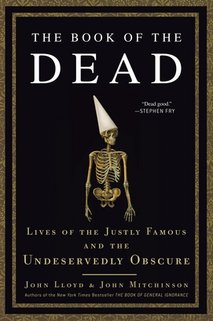
04 Oct 2010 23:13:42
Authors John Lloyd and John Mitchinson had two criteria for including subjects in their latest book: They had to be interesting — and dead. And the result is a book that is fascinating, funny and informative.
Who knew that Catherine the Great wasn't a sex addict and died after a stroke suffered in the lavatory? Or that Genghis Khan was a title, not the name of the man who "transformed a haphazard patchwork of squabbling goatherds into an empire of unparalleled strength"?
How many know that it was Edward Jenner who discovered that cowpox inoculation was a safe way to prevent smallpox, which in the late 18th century infected 60 percent of the population of Europe and killed a third of those who contracted the disease? Or that Mexican Gen. Santa Anna, who won notoriety at the Battle of the Alamo, inspired the invention of chewing gum?
The short, clever biographies list detail that is unfamiliar about even the best known subjects — including Leonardo da Vinci, Howard Hughes and Henry Ford — and more than likely not part of any official biographies in the past.
For instance, Lloyd and Mitchinson write that Hans Christian Andersen, author of "The Little Mermaid" and "The Ugly Duckling," was terrified of open spaces, sailing and either being burned or buried alive. Anderson, the co-authors say, was "so embarrassed about his skinny, concave chest" that he tried to hide it by stuffing his shirts with newspaper.
Previous collaborations by Lloyd and Mitchinson include "The Book of General Ignorance" and "If Ignorance Is Bliss, Why Aren't There More Happy People?" Their latest book follows their easy-reading style, adding a healthy dose of irony throughout.
"The Book of the Dead" can be read in small bites, but it's so tasty that putting it down between servings is hard to do. How often can history be learned in such a pleasant, sometimes even laugh-out-loud way?
Who knew that Catherine the Great wasn't a sex addict and died after a stroke suffered in the lavatory? Or that Genghis Khan was a title, not the name of the man who "transformed a haphazard patchwork of squabbling goatherds into an empire of unparalleled strength"?
How many know that it was Edward Jenner who discovered that cowpox inoculation was a safe way to prevent smallpox, which in the late 18th century infected 60 percent of the population of Europe and killed a third of those who contracted the disease? Or that Mexican Gen. Santa Anna, who won notoriety at the Battle of the Alamo, inspired the invention of chewing gum?
The short, clever biographies list detail that is unfamiliar about even the best known subjects — including Leonardo da Vinci, Howard Hughes and Henry Ford — and more than likely not part of any official biographies in the past.
For instance, Lloyd and Mitchinson write that Hans Christian Andersen, author of "The Little Mermaid" and "The Ugly Duckling," was terrified of open spaces, sailing and either being burned or buried alive. Anderson, the co-authors say, was "so embarrassed about his skinny, concave chest" that he tried to hide it by stuffing his shirts with newspaper.
Previous collaborations by Lloyd and Mitchinson include "The Book of General Ignorance" and "If Ignorance Is Bliss, Why Aren't There More Happy People?" Their latest book follows their easy-reading style, adding a healthy dose of irony throughout.
"The Book of the Dead" can be read in small bites, but it's so tasty that putting it down between servings is hard to do. How often can history be learned in such a pleasant, sometimes even laugh-out-loud way?

